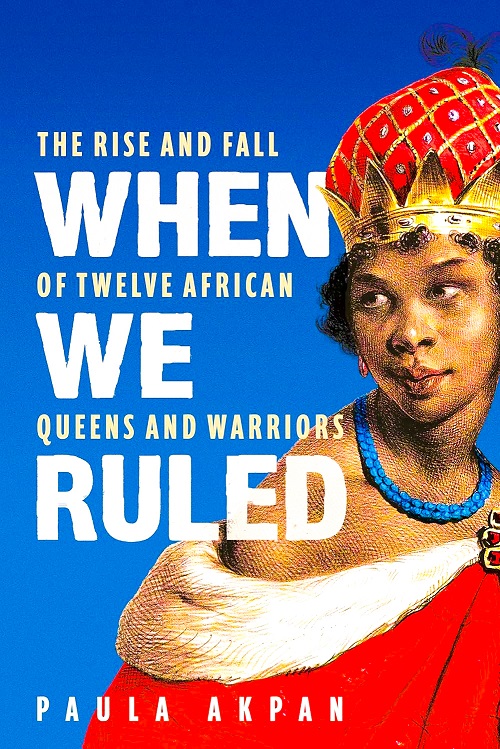WITH the advent of Women’s month in South Africa and the impending coronation of Princess Masalanabo as the seventh Rain Queen of the Balobedu nation of Modjadjiskloof in South Africa’s Limpopo Province, a tome expounding on the adventures of twelve queens and warriors who ruled vast swathes of the African continent has recently been added to the existing knowledge trove.
Authored by Paula Akpan, a Black British historian, the read takes the reader’s imagination to a timeline spanning pre-colonial Nigeria to the farming villages of Rwanda, the hills of Madagascar to apartheid South Africa – through narratives which depict how societies thrived and fractured prior to colonial influence.
The cumulative result of Akpan’s almost two months of travel from the African continent’s west coast (Cote d’Ivoire, Bénin, Ghana, Nigeria), down to its southern tip (South Africa, eSwatini, Madagascar) and back up towards its centre (Rwanda and Burundi) – her endeavour sought to untangle, decentre fixed assumptions imposed by white colonial historians through comparing and contrasting their versions with indigenous history.
Conscious of history being written by victors, in her introduction, the author confesses to have written with an intention to ‘unpick’ for Africans what she refers to as colonial ‘accountable’ histories seeking to supplant counter-history.
Among a dozen tales she dissected, one steeped in the past as well as the present which will resonate with the South African reader is that of the mystical Rain Queen of the Balobedu nation – a matrilineal dynasty which dates back to 1800 when the first ever hereditary queen assumed the reigns until her death in 1854.
Focussing on the more recent queen Makobo Modjadji VI, Akpan had travelled from London to Khehlekone Royal Palace at Ga-Modjadji pending her quest to delve into the history of rainmakers believed to possess the power to control the weather.
Makobo’s biography constitutes a tragic tale. Her mother, Princess Mmakheala Modjadji, had died, aged 37, two days before her grandmother, Mokope Modjadji V – precipitating the then 23-year-old princess’ ascendency to the throne. What then followed was a brief reign lasting from 2003–2005, when she allegedly succumbed to chronic meningitis, aged just 26.
The young monarch’s misfortunes would posthumously extend to her daughter Princess Masalanabo (who’d been some mere months old at the time of her death), when in 2022 her half-brother Prince Lekukela Modjadji – with the connivance of a faction of the all-male Modjadji Royal Council – sought to supersede her succession to the throne by citing the then teenage heiress’ “lack of preparation” as a reason.
In what would had constituted a departure to more than 200 years of rule by women had the prince and his cronies succeeded in their scheme, following a period of royal disputes and legal challenges, a court ultimately ruled in the princess’ favour – with the South African government furthermore formally recognizing her investiture in 2024. (This very August of the publication of this review, shall realize the coronation of the 20-year-old as Masalanabo II Modjadji VII.)
A hereditary role passed down a succession of female rulers with a lineage tied to the ancient Karanga kingdom of Mwanamutapa (present day south eastern Zimbabwe), the title Modjadji (meaning ‘ruler of the day’) had been bequeathed to the enigmatic monarchs whose story is an important part of South African history.
Rulers of a people who subjugated other tribes and warred against white intruders, Rain Queens have had pre and post-apartheid presidents come express homage at their kraal. The claim that they can induce rain to their allies or drought to their enemies is a belief deeply rooted in the traditions and culture of the Balobedu people, but is not scientifically supported.
Elsewhere, as an example of what Akpan refers to as colonial ‘accountable’ histories seeking to supplant counter-history, she expounds on the exploits of Njinga A Mbande, a gender-blurring ruler of Ndongo and Matamba (present day Angola) who, some two centuries prior to the 1885 Berlin Conference which culminated in European colonisation of most of Africa and Portugal’s appropriation of Angola, was already being misrepresented by the Portuguese as a ‘volatile, unstable and abject ruler who was to be distrusted and ultimately removed from power’ – all because their military and diplomatic prowess was deemed to present a threat to the occupiers’ interests.
A non-conformist, Njinga commanded their own troops into battle, wore masculine garb, kept male concubines for their carnal appetite, used a male-coded name (think singer Thandiswa Mazwai referring to herself as ’King Ta’), murdered those deemed threats to their hegemony, manipulated terms of trade (think Donald Trump’s current tangent) between their dominion and other nations – and answered to no other!
Betwixt 1622 to 1663 of their lifetime which spanned 1583–1663, they defied thirteen Portuguese governors – whose occupation of their people’s land had endured seventy years at the time they had ascended to the Ndongo throne – over ‘their’ domain, asserting that: “since I was born to rule my kingdom, I do not have to obey nor recognize another sovereign.”
Also featured in the tome are, Moremi Ajasoro, the 12th century ‘Spy Queen’ of the Yoruba of present-day south western Nigeria; Tassi Hangbé, the Regent of Dahomey; Mentewab, the Empress of Ethiopia; Ranavalona I, the anti-Imperialist Punisher from the Kingdom of Madagascar; Nana Yaa Asantewaa, the war-leading Elder, et al.
Akpan’s is a voluminous 400 plus pager whose narratives of her subjects at various places are preambled by mention of behind-the-scenes occurrences such as what herself and accomplices through her travels – who range from museum curators and tour guides, to taxi drivers, et al – indulged in at eateries in the course of researching information about her read.
The interspersion of such descriptions, which in her approach follows a pattern, momentarily destruct the reader’s imagination from total immersion into the narrative. Otherwise, her effort offers what is alluded to as a game-changing tapestry of the past.
A trade paperback, When We Ruled is published by Orion and distributed in South Africa by Jonathan Ball Publishers.
Available at leading bookstores countrywide, it retails for R440.


